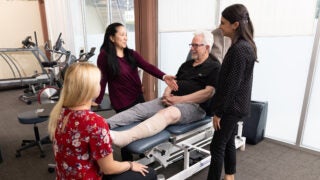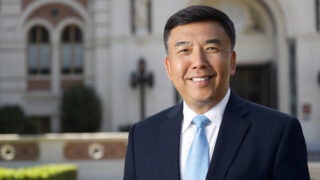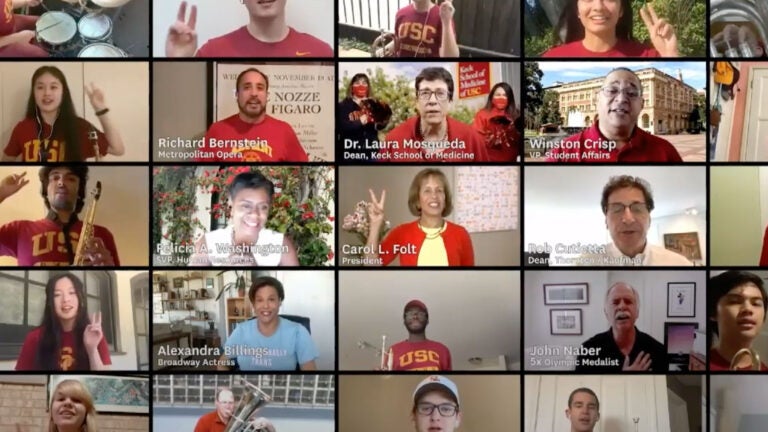
USC welcomes newest Trojans with virtual convocation
President Carol L. Folt, student leaders, USC’s deans and more greeted this year’s new students and urged them to embrace this transformative opportunity.
As anyone who “attended” Thursday morning’s fall 2020 convocation ceremony surely noticed, the format was slightly different than in previous years.
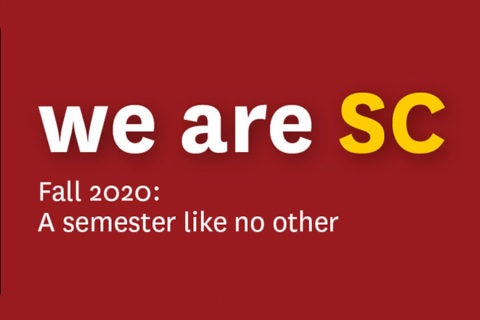 The incoming students weren’t sporting academic regalia and didn’t parade into Alumni Memorial Park in front of proud parents and USC leaders. Instead, like so many of this year’s events, the annual ceremony was entirely online. But while the venue may have been new, the traditions and sentiments of welcoming this year’s students to the Trojan Family were as heartfelt as ever.
The incoming students weren’t sporting academic regalia and didn’t parade into Alumni Memorial Park in front of proud parents and USC leaders. Instead, like so many of this year’s events, the annual ceremony was entirely online. But while the venue may have been new, the traditions and sentiments of welcoming this year’s students to the Trojan Family were as heartfelt as ever.
President Carol L. Folt encouraged all of the new Trojans entering college at this unprecedented time to not let that discourage them but rather to inspire new ideas of how to move the world forward.
“What you bring to USC is exactly what we what the world needs right now,” she said. “We need your passion for equality and opportunity, your dedication to sustainability, your embrace of technology, your commitment to hard work and your ambition to achieve excellence.”
The online convocation — broadcast live with captioning available in English, Spanish and Mandarin — may have been a first for USC, but it wasn’t the only first for the Class of 2024.
This year’s class boasts the highest average high school GPA of any incoming class in USC history, and 21% are in the first generation in their families to attend college — another record, and a 57% increase from last year’s incoming class.
Thursday’s convocation was kicked off by USC’s Dean of Religious Life Varun Soni, who also spoke about how this emotional and confusing time can be one of great innovation and transformation.
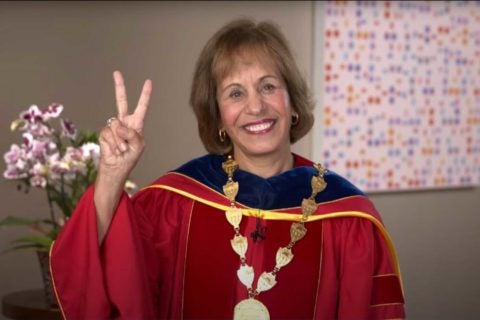
“May the University of Southern California be your place where all things lost are made good again,” he said.
Folt went a step further, telling students to use their time at USC to dream big.
“You’re in the perfect place to experiment, to shift gears and change course, to keep asking, ‘Why not?’” she said. “USC is where big dreams are nurtured and incubated and where dreams can become impactful even world-changing achievements.”
Students talk to students at USC’s convocation
Although the virtual audience may not have been wearing academic regalia, Undergraduate Student Government officer Gabe Savage — in his black robe — spoke about how the regalia is more than just pomp and circumstance, symbolizing the university’s values.
“This regalia comforts me in the idea that you, new Trojans, will leave this university ready to make a difference in the world, and that you’ll make that difference not by spouting easy answers but by asking better and harder questions,” he said.
Graduate Student Government President Melisa Osborne encouraged incoming students to embrace the strange circumstances they find themselves in as they begin their collegiate journey during a pandemic.
Online convocation includes song and speeches
After the performance of an original song by USC Thornton School of Music students, Professor Alison Trope of the USC Annenberg School for Communication and Journalism encouraged students to think critically about the messages they are receiving and how to potentially change them for future generations.
“As faculty, one of our jobs is to challenge and encourage you to engage and take stock of what has been framed as common sense,” she said. “This will be uncomfortable, yet this kind of discomfort is key to education and growth.” Words of wisdom and welcome from each of USC’s deans followed.
Folt closed the event with thoughts about John Lewis, the late congressman and civil rights leader. She commented on how his words on the 50th anniversary of the Civil Rights Act ring even truer today: We all need to do our part to push and pull together to make a difference in our society.
“You’ve already demonstrated, through your words and your deeds, your commitment to making a difference in society,” she said. “You must also use your time here to learn what it means to be part of a community, to accept as your responsibility to be a neighbor, a friend, a voice for reason, in service to others.”

